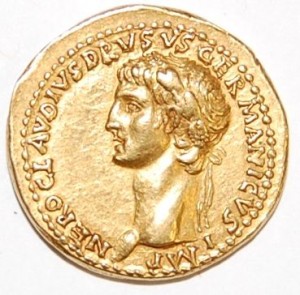This homily is based on Matthew 22:15-21.
 With every intention of trapping him, the Pharisees sent their disciples to ask Jesus what is best described as a “damn-if-you-damn-if-you-don’
With every intention of trapping him, the Pharisees sent their disciples to ask Jesus what is best described as a “damn-if-you-damn-if-you-don’
The question is: “Is it lawful to pay the census tax to Caesar?”
It’s a no-win trick question because if Jesus says “Yes,” his listeners, who harbor nothing but hatred for the occupying forces, will not be happy. If he says “No,” the Romans will not only be unhappy, but they may also decide to arrest him.
You have to give it to the Pharisees: It is a cleverly designed trap.
But how the Lord responds to the trap shows us how much more clever he is, and how not only can he beat his enemies at their own game, but also transform a trap question into a most profound one.
First, the Lord does not mince his words. He exposes the hypocrisy of his enemies as well as their scheme to trick him.
Secondly, he refuses to answer their question–at least not with a direct “yes” or “no”–and in the process, he succeeds in evading the trap in a way the Pharisees haven’t expected. Instead he answers with another–and a deceptively elementary–question: “Whose face and whose inscription are found on a Roman coin?”
His enemies supply him with the obvious answer: Caesar’s, of course!
Then the Lord responds with a line that leaves his listeners then as bewildered as it leaves us now: “Repay to Caesar what belongs to Caesar, and to God what belongs to God.”
What is the Lord trying to say in this often-quoted but enigmatic line?
Here’s my guess: Embedded in this response is the same question that he has already just asked his listeners then and that he wants to ask his listeners now. And that question is: “Whose face and whose inscription are found in your coin?” In other words, who is your Caesar?
Who is it who rules our lives–our own private emperor, to whom we, in a manner of speaking, pay our taxes? After all, “taxes” refers to that portion of what we own that we reserve and surrender to the State. What matters here is not how big the tax is, but how we always make sure to pay it unless we want to get into trouble with the government. Think about it: When we’re drawing up the budget, this is the first thing we set aside. Before we even decide how to spend what we earn, we make sure we have the proper allocation for the tax. It is, in this sense, prioritized.
So the question for us today might be: For whom do we actually reserve and surrender what we own? Who is that person in our lives whom we prioritize in terms of getting a significant portion of what we own, what we do, or even what we are?
For most people, the answer seems to be: “Myself.” We are our own Caesars–or at least this is how most of us somehow end up acting in our lives, our lip service to some Higher Power or greater cause than ourselves notwithstanding. When we weren’t looking, we managed to crown ourselves emperor, and every single decision is made using our currency, the coins and the paper bills that have our faces and names stamped all over them.
I think in today’s Gospel, the Lord is asking us to examine the currency we are using in our lives, and to ask ourselves if it should be someone else‘s face and name instead that should be on our coin.